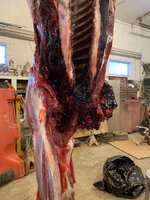justinspicher
WKR
I did a man tracking course while I was in the military, back in 2005. It was pretty legit. The instructor was a Rhodesian SAS cat and I learned a ton from him.
Fortunately, I have only had to track a few animals in my hunting career, but I’ve always been able to find them.
My most recent tracking job was last month when a buddy shot a bear. We tracked it 1200yds from where he was initially shot to his final resting place.
Patience and perseverance are keys to tracking.
Fortunately, I have only had to track a few animals in my hunting career, but I’ve always been able to find them.
My most recent tracking job was last month when a buddy shot a bear. We tracked it 1200yds from where he was initially shot to his final resting place.
Patience and perseverance are keys to tracking.

 ).
).